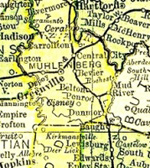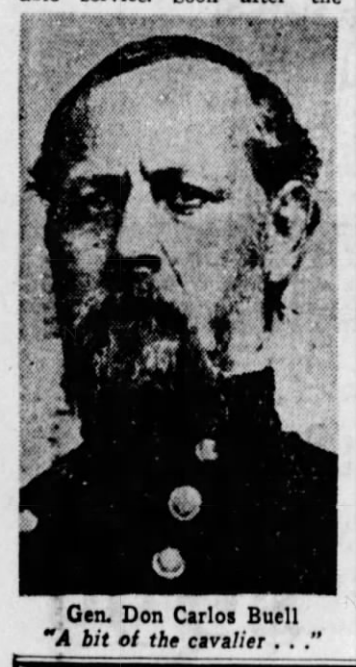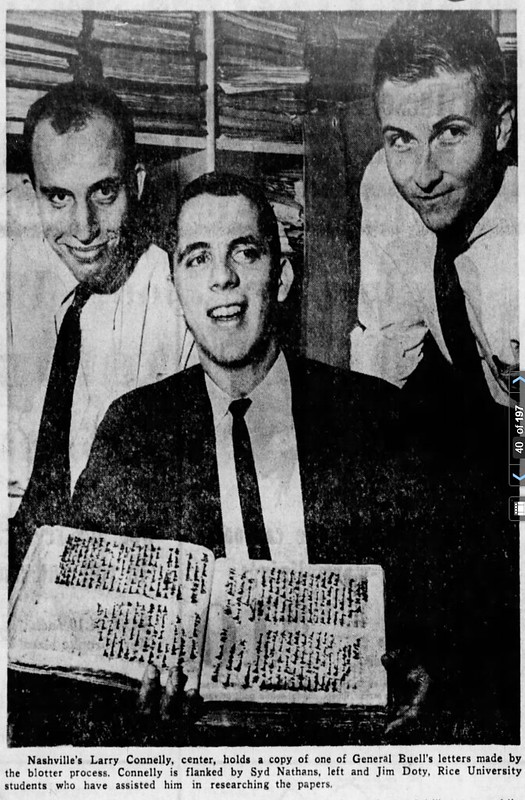Muhlenberg County Kentucky

Local History: B
Civil War Buffs Agog Over Buell Papers

The recent discovery of the “Buell Papers,” a truck full of letters and recrods of the Union Civil War Gen. Don Carlos Buell, has crated a stir among historians [all] over the nation and and unlocked new doors to the history of the period.
Of equal interest to Nashvillians is the face that a Nashville boy, Larry Connelly, now a student at Rice University, has played a leading role in the discovery of the papers, and has been the first to use the Buell source material for historical purposes.
Connelly, now a graduate student at Rice working on his doctor's degree, is the son of Mr. and Mrs. Marlin Connelly of 1028 Stonewall Drive. In Nashville he was a student at David Lipscomb College, organizer and first president of the Confederate Society, and author of a guidebook on places of historic interest around Nashville.
The Buell collection has been described by Civil War historian Frank Vandiver as one of the most important finds in the field of Civil War history during the past 10 years. It contains letters to the general from Lincoln, Grant, Sherman, McClellan, Andrew Johnson and many other leading figures of the period.
Young Connelly was assigned to investigate a report of the find by Dr. Vandiver, at a time when he was writing his master's thesis at Rice on “An Experiment in Redemption: The Confederate Invasion of Kentucky”.
Found in Trunk
The papers were found in an old Army truck on the farm of “Uncle Harry” Buell near Houston. After several months of negotiation with Connelly acting as “go-between,” the papers were turned over to Rice University where they have been microfilmed and are on a permanent loan basis.
Gen. Buell himself must have been a prolific writer and a tireless correspondent. Connelly estimates that his papers include some 11,000 items. About 8,000 of these concern Buell's activities on the Western frontier before the Civil War and his business interests in Kentucky after the war.
The Civil War papers include official transcripts of a Board of Inquiry which investigated Buell's;failure to defeat Gen. Braxton Bragg's expedition into Kentucky in 1862.
Gen. W. S. Rosecrans, who at the end of the year attacked Bragg near Murfreesboro in the Battle of Stone's River.
A graduate of West Point, Buell was a veteran of the Seminote War of 1841-42, and during the Mexican War was cited for bravery at Monterey. In the spring of 1862, he played an important part in the Battle of Shiloh, on the banks of the Mississippi River, when he marched his army of 25,000 from Nashville to the relief of Grant's battered force. Arriving during the night, Buell's men took part in the battle on the second day, doing much to turn the tide against the Confederates, who had things pretty much their way on the preceding day.
Earlier in the year, in February, it was Buell's troops who ferried the Cumberland to occupy defenseless Nashville after the fall of Forst Donelson and Henry. Buell himself had accepted the surrender of the city from Mayor Richard B. Cheatham.
Having been relieved of his command after Perryville, Buell waited for a year for another assignment. When it did not come, he resigned from the Army.
The hundreds of old letters, faded and fragile after the passing of a century, give intimate glimpses into Buell's; military life. They include a confidential letter from Gen. P. G. T. Beauregard to Bragg, captured from a Confederate courier and turned over to the Union general, and pay vouchers for Buell's spies, including his favorite, John Lelleyett, who was sent behind Confederate lines into Alabama.
Lelleyet's expenses ran up to a thousand dollars a month, including money for “bribes and alcohol.”
A government patent for a steam dishwasher, invented by Buell after he left the Army, was inclulded in the papers, along with designs for a tombstone for his wife.
From a military standpoint, perhaps the most interesting letter in the collection is a hastily written note from Gen. U. S. Grant, requesting Buell to bring his army to the vicinity of Shiloh as soon as possible.
Forerunner of Carbons
In addition to about 500 original letters written by Buell, the collection includes 12 volumes of “letter-press” copies of Buell's letters running to 8,400 pages.

This system, Connelly explains, was a forerunner of the carbon copy. Newly written letters, with the ink still wet, were rolled against a sheet of onion-skin paper to make a copy.
After a long study of Buell, Connelly offers this word picture of the Union commander:
“Stern and an excellent organizer and drillmaster… Like Bragg, fearful of making the final decision…very brave personally, with a bit of the Southern cavalier in him.”
Buell's home was on Green River, in Kentucky, but his Nashville relatives have made the name well known in this community in the years since the war.
A son of George P. Buell, the general's cousin, who lived in Nashville, was named for Don Carlos Buell. With Vaulx Crockett, whose descendants also live in Nashville, he organized the insurance firm of Buell and Crockett, which later became the present firm of (Paul) Turner and (Dempsey) Weaver. Miss Rochette Buell, a daughter of this Don Carlos, lives at 117 28th Ave., N., Nashville. Her nephew, the present Don Carlos Buell, lives in Cambridge, Mass.
Larry Connelly, who was married last August to Sally Eaves of Athens, Tenn., reports that he is the only historian to yet make use of the Buell papers. His master's thesis won the Rice Longcope Research award - the second time in the school's; history the award has been given. This thesis may be published as a book.
For his doctoral dissertation, Connelly writes that he is working on a long-range project, a multivolume history of the Army of Tennessee, the first volume of which will constitute the thesis.
Completion of the work may require 12 years.
Connelly writes that for $5 he bought the old Buell trunk - with the false bottom but minus the letters - from “Uncle Henry” Buell. He brought it home, but “it was such an eyesore I feared I would have to get rid of it. But Sally made a slip cover for it, and not it stands in the living room. You'd never guess it was not a hi-fi.”
Source: Walker, Hugh. “Civil War buffs agog over Buell papers.” Nashville Tennessean [Nashville, TN], 29 Oct 1961, p. 4B.
Updated July 13, 2022